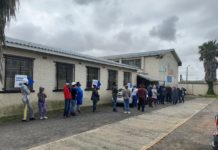Many of the foreigners from Zimbabwe, Malawi and Mozambique who fled to camps around Durban following the xenophobic violence of the past month were repatriated. But those from war-torn Burundi and DRC are stuck – the can’t go back to the communities they fled, and can’t return to their war-torn countries. MARTIN KATANA, told Doctors Without Borders (MSF) about the difficulties he, his wife, and baby now face.Â
You know this xenophobia; I think everyone knows the story. It was not safe, so we came in the camp. Our neighbours, our friends – they come to fight with us; they come to kill us. I got refugee status cause I am long here, from 2006. I got all the papers, is allow me to work, studying. Now we can’t work because of this new problem.
Healthcare, we get – it was no problem, but since this xenophobia was starting, it was a big problem. The baby was born in South Africa. I take my baby to the clinic, to hospital. By the time we came here, they tell us: “No, how you came here? You must take the baby to your country, because it’s not from South Africa.â€
I say: “No, why? Baby was born here, how can you say he’s not from South Africa? You tell me to take him to Congo but he was born here.â€
They say: “Why you are still here? You must go back to your country. You are kwerekwere. We don’t need kwerekwere in this country, so you must go back to your country. What you still doing in South Africa?â€
Even a taxi too, to get a taxi, they say” “No, what you doing here? You must go to your country.â€
I’m not safe because the people (that) come to fight with us is our neighbours. He was my friend, he was my neighbour, no problem. But next two minutes, he is changing his mind.
In the camp, the situation is not good. It’s not good because you can see, one tent, maybe a hundred, two hundred people. The water situation is not good and even the toilet is not good. So one toilet, two toilet, 500 people. How can it be a good condition?
Please, if you can tell the people in charge of the refugees, like UNHCR – we need, please, if they can come and see us, to talk to us and they can think how they can take care us, so the place can be safe.
To go back to my place I was staying before – I’m not safe. So how can I go back there, because they’re still there?
Speaking to MSF South Africa, this is Martin’s story:

![Martin Katana [screenshot from MSF video]](https://www.thedailyvox.co.za/wp-content/uploads/2015/05/Martin-Katana-screenshot-from-MSF-video.png)







